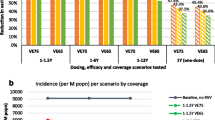Abstract.
Varicella is a potentially serious infection not only in immunocompromised individuals but also in otherwise healthy adults and children. Vaccination plays an important role in preventing the disease and its sequelae. A universal vaccination in childhood is expected to reduce substantially the number of uncomplicated cases of varicella and decrease the number of complicated cases requiring hospitalisation. To generate data as basis for decisions of the health authorities concerning prevention of varicella, epidemiological and health-economic data were collected in two studies. Using an age-structured decision analytic model the benefits, costs and cost effectiveness of a varicella immunisation program for a period of 30 years were assessed. It was shown that after the first year of life seroprevalence rates increased steadily and reached 62% among the 4- to 5-year olds and 94% among the 10- to 11-year olds, respectively; 90% of varicella patients were younger than 12 years. A severe course was assessed for 16.3% of the cases. Overall incidence of complications was estimated to be 5.7%. A routine varicella vaccination program targeting healthy children could prevent 82.7% of varicella cases and over 4,700 major complications per year provided the coverage level was 85%. Under these conditions the elimination of varicella is predicted to be achievable within 18 years. It is expected that a combined measles, mumps, rubella and varicella vaccine could provide the required coverage. Average yearly discounted net cost savings of universal childhood vaccination are 51 million Euro with a benefit-cost ratio of 4.12. Childhood vaccination with catch-up of adolescents provides additional clinical benefits. The break-even point indicating first net savings could be achieved already 3 years after the implementation of the vaccination program. In summary, routine childhood varicella vaccination appears to be a highly efficient strategy to significantly reduce the sizeable burden of varicella and would lead to net savings from both the societal but also the payer perspective.
Similar content being viewed by others
Author information
Authors and Affiliations
Additional information
Electronic Publication
Rights and permissions
About this article
Cite this article
Wutzler, P., Neiss, A., Banz, K. et al. Can varicella be eliminated by vaccination? Potential clinical and economic effects of universal childhood varicella immunisation in Germany. Med Microbiol Immunol 191, 89–96 (2002). https://doi.org/10.1007/s00430-002-0123-4
Received:
Issue Date:
DOI: https://doi.org/10.1007/s00430-002-0123-4




